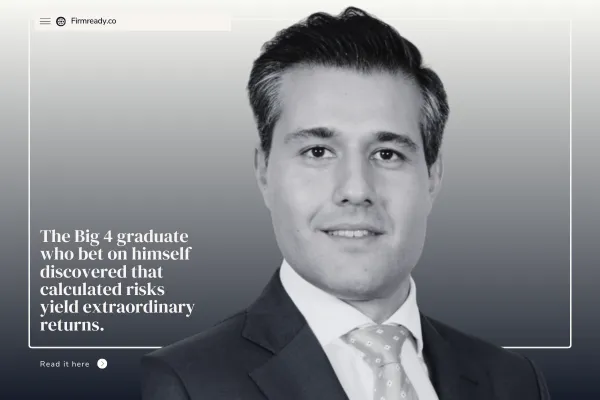
Lessons from the Top - Muhammed Angun
Does anyone dream of becoming an accountant as a child? Probably not.
But the reality is, you do the subject, you realise you're good at it and enjoy the theory, then you realise how valuable it is to become an accountant, and then you pursue a career that opens you up to countless opportunities around the world.
Meet Muhammed. This 'Lessons from the Top' story didn't originate from down under in Australia, but it goes to show how this industry can open you up to networks not only in your home country, but around the world.
Muhammed grew up and studied in the Netherlands, but here's what I found interesting: he didn't just stumble into accounting because he could crunch numbers in his sleep. He was genuinely fascinated by the idea of seeing companies "from A to Z" – getting the full picture, not just the sanitised version they put in their annual reports.
He started his career in Audit at PwC, where he imagined CFOs hanging on his every word, companies reshaping their entire operations based on his recommendations. Reality hit differently:
"Before working in the industry, I had more the feeling like everything will happen what the accountant or auditor will say... But in practice, it is about sharing your opinion. Then the company leadership will share their opinion, and then you will see if you can find the middle."
Muhammed's genuine interest in understanding businesses holistically kept him engaged for nine years. So, if you're only in it for the "stable career path" your parents keep mentioning, you might find yourself questioning that choice around year three when you're staring at your 150th bank reconciliation.
Muhammed catapulted into the industry and quickly realised what universities don't teach you: "how to build a relationship with the client, or how important networking is." The Dutch education system (like most others) assumes you'll magically develop these skills through osmosis. You won't. You'll develop them through awkward client meetings and uncomfortable conversations...
Muhammed's professor told him something that stuck:
"It's not only the knowledge what makes you a great accountant or auditor, it's more the soft skills."
This came at a crucial moment when Muhammed was ready to quit because he couldn't pass a particular exam (We've all been there, haven't we?)
But here's the thing about soft skills in accounting – they're not just "nice to have." They're survival skills. Muhammed discovered this became critical at the assistant manager level, where you're not just discussing whether someone needs to provide documents, but "discussing the whole strategy, the whole purpose of the audit."
After eight and a half years in the Netherlands, Muhammed got that familiar itch.
"My advice, not only for junior accountants, but to everyone, to all students, please, if you have any, if there is a small thought about, hey, shall I do an exchange? Please do it. I didn't do it. I regret it."
The Middle East was calling – a region "full in development" where he could witness firsthand the kind of economic transformation that makes accountants weak in the knees. When an opportunity came up at EY Dubai in the Financial Accounting Advisory Services team, Muhammed made a decision that would make any risk-averse accountant proud: he calculated the downside.
"I always think, I prefer to regret things I do than regret things I don't do... What's the worst thing? I will not die, so I will just go back and I will continue my career."
Muhammed thought moving to Dubai would be "piece of a cake." He spoke English, he was good at audit, he was a people person. What could go wrong? Everything, apparently.
"I moved from a country to another country... moved from one firm to the other... and I left audit (and went into advisory). So actually there were three changes, and all three had different challenges."
Muhammed discovered that his Dutch directness – that beautiful, no-nonsense approach that makes conversations so refreshingly efficient – didn't always translate well in Dubai. The breaking point came when a CFO asked him to do something, and Muhammed responded with a simple "No, I cannot do it." The CFO was offended. Muhammed was confused. "Don't you want from me an honest answer?"
It turns out that mastering cultural nuances is just as crucial as technical skills in global business.
In his second year in Dubai, Muhammed was handed the keys to one of the biggest IPOs in the UAE. Small problem: he'd never done one before. Bigger problem: he had to lead the entire team through the process. The project lasted 13-14 months. Muhammed not only survived but thrived, getting promoted to senior manager shortly after.
Sometimes the best opportunities come disguised as terrifying challenges. Muhammed's journey proves that your career doesn't have to follow a predetermined path – sometimes the most calculated risk is the one that pays off in ways you never expected.